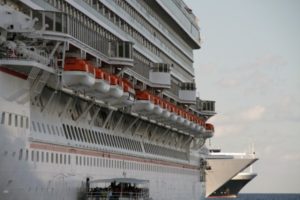 The International Maritime Organization (IMO) said a set of important amendments to the International Convention for the Safety of Life at Sea (SOLAS) and various codes mandatory under the Convention will enter into force on January 1, 2020.
The International Maritime Organization (IMO) said a set of important amendments to the International Convention for the Safety of Life at Sea (SOLAS) and various codes mandatory under the Convention will enter into force on January 1, 2020.
The new measures include addressing lifeboat maintenance to prevent accidents with lifeboats; the required subdivision of passenger ships to increase their safety; the planning for evacuation on cruise ships; and the expansion of maritime satellite communications equipment providers, according to an IMO release.
The full list of SOLAS amendments entering into force come first of January:
- Amendments to make mandatory the requirements for maintenance, thorough examination, operational testing, overhaul and repair of lifeboats and rescue boats, launching appliances, and release gear. This package of provisions aims to prevent accidents with survival craft and addresses longstanding issues such as the need for a uniform, safe and documented standard related to the servicing of these appliances.
- Amendments to extend the requirements for evacuation analysis to all passenger ships, not just ro-ro passenger ships. Associated revised guidelines on evacuation analysis for new and existing passenger ships were also approved.
- Amendments on preventing the internal corrosion and clogging of sprinklers and new mandatory requirements for helicopter facility foam firefighting appliances.
- Amendments on protection against noise, on firefighting, and on harmonizing the survey periods of cargo ships not subject to the Enhanced Survey Program Code.
- Amendments relating to ships engaged in anchor-handling operations and to ships engaged in lifting and towing operations, including escort towing.
- Amendments that clarify the distribution of crew in public spaces for calculating the width of stairways.
- Amendments on aligning the wheelhouse window fire-rating requirements in the IGC Code (International Code for the Construction and Equipment of Ships Carrying Liquefied Gases in Bulk) with those in SOLAS chapter II-2.
- A set of amendments relating to subdivision and damage stability, focusing in particular on new passenger ships. In conjunction, revised explanatory notes to SOLAS chapter II-1 subdivision and damage stability regulations and revised guidance for watertight doors on passenger ships which may be opened during navigation were also adopted.
- Amendments relating to the definition of “vehicle carrier” and new regulation on fire safety requirements for cargo spaces containing vehicles with fuel in their tanks for their own propulsion, specifically vehicles which do not use their own propulsion within the cargo space.
- Amendments to clarify the requirements for fire integrity of windows on passenger ships carrying not more than 36 passengers and on special purpose ships with more than 60 (but no more than 240) persons on board.
- Amendments on damage control drills for passenger ships, to require such drills to take place on all passenger ships from 2020.
- Amendments concerning computerized stability support for the ship’s master in case of flooding, for existing passenger ships.
- Amendments replacing all references to “Inmarsat” with references to a “recognized mobile satellite service.”
- Amendments in line with the latest recommendations of the United Nations Recommendations on the Transport of Dangerous Goods, including new provisions regarding IMO type 9 tanks, a set of new abbreviations for segregation groups and special provisions for the carriage of lithium batteries and vehicles powered by flammable liquid or gas.
- Amendments concerning fire protection materials and required approval test methods for passenger ships and high-speed craft.
- Amendments to the model forms of the Certificates of Fitness, clarifying the requirement for an approved loading and stability manual/booklet to be supplied to the ship, under the International Code for the Construction and Equipment of Ships Carrying Dangerous Chemicals in Bulk (IBC Code), IGC Code, Code for the Construction and Equipment of Ships Carrying Dangerous Chemicals in Bulk (BCH Code), Code for Existing Ships Carrying Liquefied Gases in Bulk (EGC Code), and the Code for the Construction and Equipment of Ships Carrying Liquefied Gases in Bulk (GC Code).
Image by Monica Volpin from Pixabay
